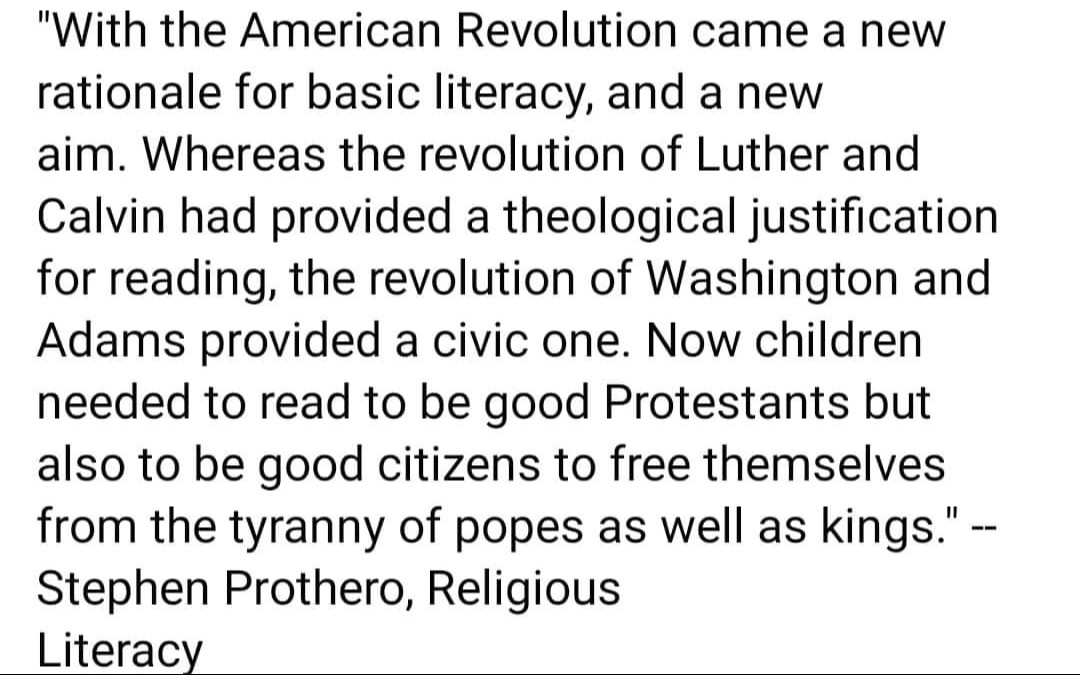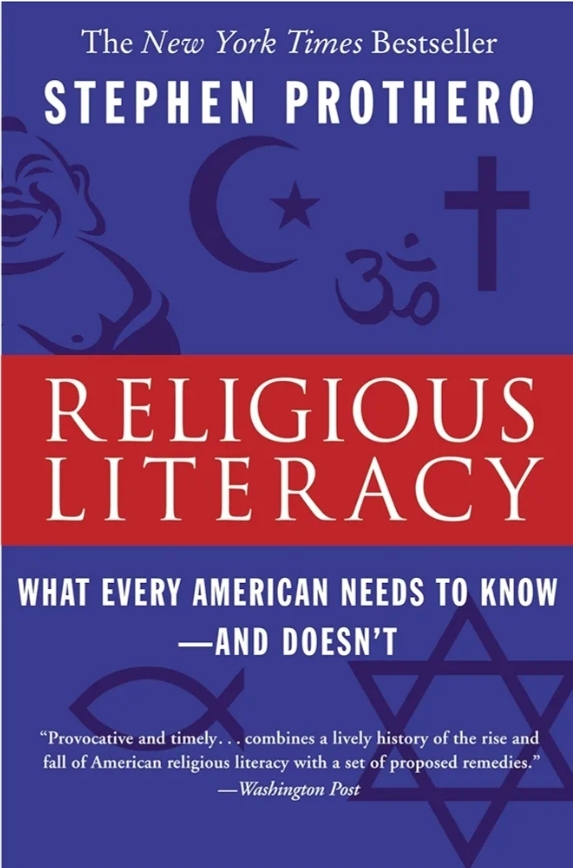Religious Literacy: What Every American Needs to Know—And Doesn’t by Stephen R. Prothero
Stephen R. Prothero, a prominent professor of religion, examines the concerning lack of religious knowledge among Americans and its implications for society, culture, and democracy. The book advocates for religious literacy, not as a matter of personal faith, but as an essential tool for navigating a world where religion plays a critical role in history, politics, and global affairs.
Main Themes and Arguments
The Crisis of Religious Illiteracy
- Definition of Religious Illiteracy:
Prothero defines religious illiteracy as the widespread ignorance about basic religious concepts, traditions, and histories. - Extent of the Problem:
Most Americans, despite identifying as religious, lack fundamental knowledge about their own faith traditions, let alone those of others. For example, many cannot name the Ten Commandments, identify the four Gospels, or explain basic tenets of other world religions like Islam or Buddhism. - Impact on Society:
This ignorance undermines informed citizenship and public discourse, especially in a world where religion significantly influences politics and international relations.
Why Religious Literacy Matters
- Informed Citizenship:
Prothero argues that a democracy requires an educated citizenry. Understanding religion is vital for interpreting laws, political movements, and societal trends.- Example: Issues like abortion, same-sex marriage, and immigration often have religious underpinnings.
- Global Understanding:
Religion is a key driver in global conflicts and cooperation. Without understanding the beliefs and practices of others, Americans risk misinterpreting global events.- Example: Misunderstandings of Islam and its diverse sects can lead to oversimplified and harmful policies.
- Cultural Competence:
Religion is deeply woven into art, literature, and history. Being literate in religious traditions enhances cultural appreciation and critical thinking.
The Decline of Religious Knowledge in America
- Historical Context:
Early America was highly religiously literate, with individuals required to read and understand religious texts.
- Secularization of Education:
The removal of religion from public schools has contributed to this decline. While separation of church and state is essential, Prothero argues this has led to a void in religious education. - Rise of “Spiritual But Not Religious” Movement:
A growing number of Americans identify as spiritual rather than religious, which often leads to disengagement from organized traditions and their histories.
4. A Call for Religious Education
- Education Reform:
Prothero advocates for mandatory, nonsectarian religious studies in schools to build religious literacy while respecting constitutional boundaries. - Focus on World Religions:
Learning about major world religions—Christianity, Islam, Judaism, Hinduism, and Buddhism—can foster mutual respect and reduce prejudice. - A Practical Guide:
The book includes a glossary of religious terms, major texts, and key figures to provide readers with foundational knowledge.
Prothero’s Key Proposals
- Reintroduce Religion into Public Education:
- Teach students about the Bible and other sacred texts as literature, emphasizing their historical and cultural significance rather than theological interpretation.
- Offer courses on world religions to foster global understanding.
- Promote Interfaith Dialogue:
- Encourage open conversations among individuals of different religious backgrounds to dispel stereotypes and foster mutual respect.
- Equip Citizens to Analyze Religion’s Role in Current Events:
- Understanding religious motivations can lead to more informed discussions about domestic and international issues, such as terrorism, environmentalism, and humanitarian efforts.
Strengths of the Book
- Accessible Writing Style:
Prothero writes in a way that is engaging and easy to understand, making complex topics approachable. - Practical Resources:
The glossary and summaries of key religious concepts are valuable tools for readers. - Timely Argument:
In an increasingly polarized world, the call for religious literacy feels urgent and necessary.
Criticisms
- Overemphasis on Religion’s Role:
Some critics argue that Prothero places too much weight on religion as the key to understanding global events, sidelining economic, political, and cultural factors. - Implementation Challenges:
Integrating religious studies into public education while maintaining neutrality could prove controversial and difficult.
Religious Literacy by Stephen R. Prothero is a compelling call to action for Americans to confront their lack of knowledge about religion. By fostering an understanding of the major world religions, their histories, and their impact, Prothero believes society can become more informed, empathetic, and capable of addressing the challenges of a diverse and interconnected world. His book is a roadmap for bridging the gap between ignorance and understanding in a way that benefits individuals, communities, and nations.

In Religious Literacy: What Every American Needs to Know—And Doesn’t, Stephen Prothero discusses the historical evolution of literacy in America, specifically how the American Revolution created a new rationale for basic literacy, distinct from previous religious or monarchical justifications for reading and education.
Context and Historical Background
Prothero makes the point that the American Revolution not only fundamentally reshaped the political landscape but also altered the way literacy was perceived and valued. Prior to the Revolution, religious motivations (particularly stemming from figures like Martin Luther and John Calvin) had been the primary drivers behind the promotion of literacy. These religious leaders encouraged reading as a means of directly engaging with sacred texts, such as the Bible, in their native languages. In Protestant traditions, literacy was often seen as a necessity for personal salvation and a means of connecting with God directly, without the mediation of a priest or the Church hierarchy.
However, with the advent of the American Revolution and the establishment of the United States, literacy took on a new dimension. As Prothero explains, the Revolution of Washington and Adams brought with it a civic rationale for literacy—one that emphasized the need for education to become an active, informed participant in the newly formed democratic society.
Civic Literacy: A New Justification for Reading
- Freedoms and Rights of Citizens:
One of the core ideas behind the American Revolution was the concept of individual liberty and freedom from oppression, both from foreign monarchs (like the British crown) and from internal religious dogma (such as the tyranny of the Catholic Church or any centralized religious authority). In the new republic, literacy was no longer just about reading religious texts; it was about gaining the knowledge necessary to exercise freedom responsibly. - Democratic-Republic Participation:
For the Founding Fathers, an informed citizenry was crucial for the survival of the American experiment. Prothero highlights that literacy became essential not just for personal enlightenment but for active civic engagement. Citizens needed to read to understand their rights, vote responsibly, and participate in the creation of laws and policies. - Opposition to Tyranny:
The new rationale for literacy was also connected to the idea of self-government—to protect themselves from the tyranny of kings and other oppressive authorities, citizens had to be able to read the writings and documents that formed the basis of the government, such as the Constitution, the Bill of Rights, and the Federalist Papers.
Luther, Calvin, and the Revolution of Washington and Adams
- Religious Foundations of Literacy:
Prior to the American Revolution, the push for literacy in the Protestant world had been closely linked to the individual’s relationship with God. Reformers like Luther and Calvin emphasized the importance of reading the Bible in one’s native language to foster direct communion with God and to escape the control of the Church. They believed that education and the ability to read were key to spiritual salvation and individual autonomy. - From Religious to Civic Motive:
The Revolution of Washington and Adams transformed this understanding. Whereas earlier generations of Americans might have been primarily motivated to read in order to better understand religion and their place within a religious community, the new aim became to serve as informed citizens who could actively contribute to and protect a democracy. This shift highlights how education became a tool of freedom, independence, and responsibility rather than merely a religious obligation. - Empowerment Against Oppression:
In a democratic society, literacy became a fundamental tool in resisting tyranny. Just as Protestants needed to be literate to challenge the authority of the Church, Americans needed to be literate to understand their rights and challenge any potential government overreach or encroachment on personal freedoms. This idea is particularly crucial when we think about the writings of the Founding Fathers, which called for education as a tool of empowerment rather than mere survival.
The Importance of Literacy for Personal and National Freedom
Prothero argues that literacy is crucial to personal freedom in both a civic and intellectual sense. During the American Revolution, this idea was deeply intertwined with the concept of democratic-republic and the idea that individuals should be able to read and understand key documents of national importance. Thus, literacy was seen as a way to be not only a good Protestant or a good religious person, but also a good citizen who could critically engage with the concepts that defined their governance and rights.
Key Takeaways:
- Religious Literacy as Civic Duty: The shift in America during the Revolution made literacy a necessary skill for participating in a democratic society, not just for religious reasons.
- Literacy as a Defense Against Tyranny: Being educated in both religious and civic matters helped people protect their liberties, resist oppression, and engage in the responsibilities of self-governance.
- Education’s Evolving Role: While earlier calls for literacy in the West were based on religious need, the American Revolution redefined it as part of a civic obligation, emphasizing the need for informed, active citizens to preserve and protect freedom.
- The Civic Revolution of Washington and Adams: These Founding Fathers were not only advocating for political independence from Britain but also for intellectual independence through literacy, which empowered citizens to actively shape their nation’s future.
In sum, Prothero highlights how the American Revolution fundamentally redefined the role of literacy. It was no longer only about religious knowledge; it was about the freedom and responsibility of citizens to understand, participate in, and protect their democratic-republic society.







